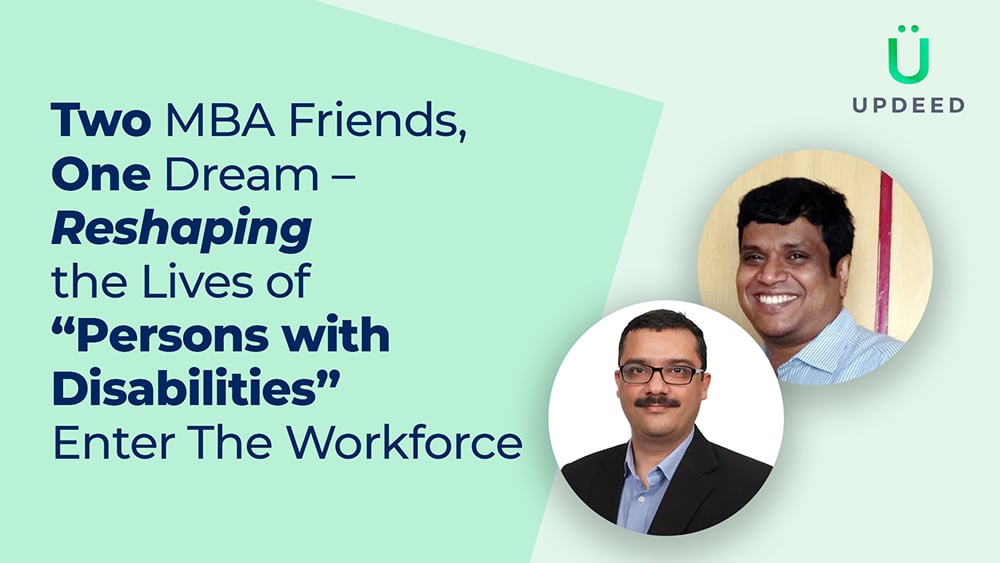Two MBA Friends, One Dream – “Reshaping the Lives of People with Disability Enter The Workforce”
In a world marked by inequity and societal challenges, two individuals set out on a mission to solve a pressing problem using an entrepreneurial approach.
Rajasekharan Pazhaniappan and Shashank Awasthi, both from the same MBA school and with eight years of corporate experience, co-founded v-shesh in 2009, an enterprise dedicated to disability inclusion.
“Initially, we aim to bridge the gap and provide opportunities for individuals facing barriers to employment, depending on the place of living (rural/urban), gender, caste, and disabilities,” said Pazhaniappan while talking to UPDEED.

The initial phase
Initially faced with many ideas, Pazhaniappan was determined to address the root cause of inequity and lack of basic needs, which they identified as the lack of opportunities to earn. They understood the pivotal role of the first job in instilling confidence and shaping an individual’s outlook.
According to Pazhaniappan, the team embarked on a mission to remove the barriers to entry into the job market, starting with rural areas and women seeking to reenter the workforce after pregnancy.
He added that the initial focus was in Varanasi, Indore, Bihar, and Odisha, providing basic skills training and preparing individuals for jobs in the microfinance industry.
However, their plans took an unexpected turn when the microfinance industry faced a sudden collapse, leaving them searching for a new purpose.
Crisis giving birth to the idea of empowering PwDs
During this crisis, they received a suggestion from a colleague to extend their work to people with disabilities. Intrigued by this idea, they began serving this often-overlooked section of society.
The v-shesh model is straightforward yet impactful.
The team of 50 professionals across India engages with individuals to understand their needs, identify challenges, and enhance their training to meet industry requirements.
They collaborate with various sectors to provide high-quality and aspirational job opportunities for
Persons with Disabilities (PwDs) in banking and financial services, information technology, hospitality, retail, e-commerce, and technology-enabled services.
Further recognising the unique needs of people with neurodivergent conditions like autism and ADHD, v-shesh developed a specialised program called Onwards, said Pazhaniappan.
He added that this initiative works with small groups of three to five individuals over three to five months, focusing on practical skills tailored to their specific requirements.
Derives satisfaction
The v-shesh team derives a deep sense of satisfaction from their work.
While they encounter tough and frustrating moments due to the slow pace of progress and disappointing setbacks, they firmly believe that employment acts as the litmus test of inclusion.
Pazhaniappan said witnessing the positive transformation in individuals and their families outlook towards disability brings immense joy. However, there is still much work to be done, and the team is committed to continuing its efforts with full force.
While v-shesh’s initiatives have made a significant impact, they emphasise that more support and involvement from the industry are crucial.
“There is a need for greater participation from organisations, sectors, and individuals to collectively address the needs of the approximately 80 to 90 million people living with disabilities in India,” said Pazhaniappan.
He added that people with disabilities are equally valuable and capable as any other individual.
The notion of perceiving PwDs as different and less valuable stems from deeply ingrained biases. These biases have created immense barriers for disabled individuals from the outset, including societal stares and excessive helpfulness.
The daily challenges have fostered resilience, innovative thinking, and out-of-the-box problem-solving skills in people with disabilities, and these qualities are precisely what every work environment and talent manager requires, said Pazhaniappan.
Challenges and the way forward
The v-shesh team faces several challenges in their endeavor. The primary obstacle is the attitudinal barrier – the fear and apprehension surrounding a person’s ability to perform a job often hinder their chances during interviews.
Bias among those responsible for candidate selection
further compounds the issue, necessitating more objective evaluation processes.
Many times, the invisibility of certain disabilities poses a challenge, as people often search for visible impairments rather than understanding the individual’s needs.
To address these challenges, it is vital implementing significant changes at the education level, said Pazhaniappan.
Access to quality education must be improved, as the lack thereof creates a significant skills gap. Sensitisation, awareness, and societal acceptance are crucial to changing attitudes towards disabled individuals.
Furthermore, the early introduction of technology in schools can empower disabled people, providing them with the dignity of a self-sufficient life and opportunities to excel.
As per Pazhaniappan, empowering people with disabilities requires a collective effort. By embracing diversity and leveraging the untapped potential of disabled individuals and can foster a society that thrives on the strength and resilience of every individual, regardless of their abilities.
Ready to make a positive impact in the world?
UPDEED is the place for you. Our free and open platform is filled with inspiring stories from individuals and organizations who are making a difference in their communities and beyond. Connect and collaborate with like-minded individuals from around the globe on UPDEED, and discover your own potential to create meaningful change. Join our community and make a difference.





